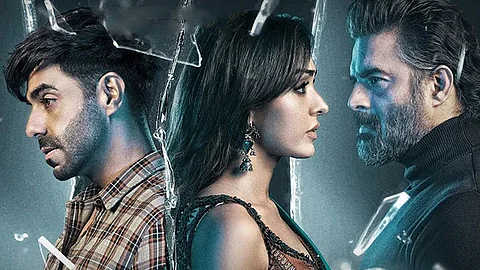
- Reviews
- Power List 2024
- Cannes 2024
- In-Depth Stories
- Web Stories
- News
- FC Lists
- Interviews
- Features
- FC SpecialsFC Specials

Haq Gul (Aparshakti Khurana), an alleged terrorist from Kashmir with honey eyes, escapes from a jail in Mumbai. He runs into Springshine Apartments, a vertical slab of housing a stone’s throw from Mazgaon Docks, and takes one of the houses on the third floor hostage. The only person at home is Sanchi (Khushalii Kumar), hips bare, a tight blouse, and a sari of the kind of watery material that is made to slip, not stay on the body. Her pot-bellied husband, Yatharth (R. Madhavan), is at work, and the house-help is at the market. Sanchi is too perfect a lamb for this invasion. Almost as if the situation was crafted too carefully, too strategically, by a squint-eyed writer in a room. Are we supposed to believe any of this is accidental?
The first twist whacked over our heads with Amar Mohile’s background score — which, if I am being honest, if I am allowed a second’s snark, for the two-hour duration, held us hostage — is that Sanchi is mentally ill. The second twist questions the first twist. Is she ill or does her husband feed her pills to make her ill? The third twist questions the second, and so on the film blares. There is a parallel twist, where Haq Gul’s innocence is established, then doubted, then re-established to be re-doubted, and so on the film blares. Sanchi and Haq fall in love, or Sanchi is manipulating Haq with her slipping sari and heaving blouse or Sanchi truly feels for him what she could never feel for Yatharth, and so on the film blares. The police (Darshan Kumaar) swoop in, stammering and angry, neck veins throbbing, and there is another parallel twist where their moral pedigree is established to be shaken to be re-established, and so on the film blares. Blares. The film doesn’t proceed. It blares.
There is a moving human kernel in the midst of this concocted, craven mess, but Dhokha is too reliant on technology to take this kernel seriously. The cinematography by Amit Roy forces you to pay attention to his shaky hand-held frames, to the tension he is so consciously curating that it lacks any of the presence of space and time that thrillers need. The film begins with what is supposed to be one uninterrupted shot introducing Sanchi and Yatharth as they fall in and out of love. (Note to filmmakers: That one-long take from the ocean gliding to the building, swooping into the apartment through the grills, is no longer as impressive, and certainly not as novel as you think it is. Merely technology isn't enough to produce awe.)
But writer-director Kookie Gulati’s direction and staging is so terribly banal, the acting so lacking in body and vim, you are forced, instead, to notice more sincerely the attention-seeking swoops, shakes, and stitches of Roy’s cinematography and Dharmendra Sharma’s editing. To be noted here, both Roy and Mohile come from Ram Gopal Varma’s Sarkar days, where there was something pioneering about Verma giving equal if not more importance to technology over the human drama that technology is supposed to buoy and gild. Now that Varma’s cinema has been rendered rotten, who is Gulati — whose credits include Prince (2010) and The Big Bull (2021) — to remain standing?
Mohile’s score takes the kind of spotlight that is reserved for the protagonist. The sounds are not meant to capture the internal turmoil and tension of the characters, as much as insist on their own personality, separate from the characters. So, when Yatharth first finds out — via a news report on the television — that the building which is held hostage is his apartment, the background score registers the shock first in a jarring thrum, before the film realizes that, oh, the protagonist is actually Yatharth and, only then do we see his face, and the shock writ large on it. This delay, this preference to technology over humanity, is textbook amateur direction. In another scene, we see Gul shooting a gun in the house, following which there is a whole second where we merely register the bullet being flung, and only then do we see people outside reacting to it, caving their bodies to be save. As an audience, then, our emotional instincts and reactions are aligned to the soundtrack leaking feeling and not the people that populate the screen with feeling.
There is no doubt that the movie takes the unpredictability of being mentally ill and milks it for narrative tension. It is the kind of film that cannot distinguish innocence from dementia. I can imagine the number of times “Rashomon” was used while making the film. Pat pat pat on the back. This swerving of perspectives that is supposed to make the plot feel “schizophrenic”, as though inside the brains of everyone, everywhere all at once. There is something exploitative about this but, really, when the craft is so broken, so barely present, of what use is finding cracks with the ethics that guide it?